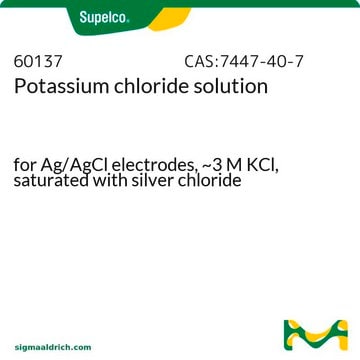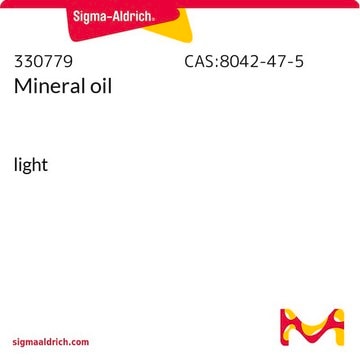All Photos(1)
About This Item
Linear Formula:
LiCl
CAS Number:
Molecular Weight:
42.39
MDL number:
UNSPSC Code:
26111700
PubChem Substance ID:
NACRES:
NB.61
Recommended Products
Quality Level
concentration
1 M in ethanol
density
0.83 g/mL at 20 °C
SMILES string
[Li+].[Cl-]
InChI
1S/ClH.Li/h1H;/q;+1/p-1
InChI key
KWGKDLIKAYFUFQ-UHFFFAOYSA-M
Looking for similar products? Visit Product Comparison Guide
General description
Lithium chloride solution is generally used as a liquid desiccant for hybrid solar desiccant cooling systems. Though it is corrosive in nature, it does not vaporize in air at ambient conditions.
Application
Filling solution for reference electrodes used for titrations in nonaqueous solutions
Signal Word
Danger
Hazard Statements
Precautionary Statements
Hazard Classifications
Eye Irrit. 2 - Flam. Liq. 2
Storage Class Code
3 - Flammable liquids
WGK
WGK 1
Flash Point(F)
57.2 °F - closed cup
Flash Point(C)
14 °C - closed cup
Personal Protective Equipment
dust mask type N95 (US), Eyeshields, Gloves
Choose from one of the most recent versions:
Already Own This Product?
Find documentation for the products that you have recently purchased in the Document Library.
Customers Also Viewed
Study of an aqueous lithium chloride desiccant system: air dehumidification and desiccant regeneration
Fumo, Nelson, and D. Y. Goswami.
Solar Energy, 72 (4), 351-361 (2002)
Aitor González et al.
PloS one, 8(1), e53323-e53323 (2013-01-18)
The mouse segmentation is established from somites, which are iteratively induced every two hours from the presomitic mesoderm (PSM) by a system known as the segmentation clock. A crucial component of the segmentation clock is the gene Hes7, which is
Karla M Acevedo et al.
The Journal of biological chemistry, 289(16), 11007-11019 (2014-03-13)
Amyloid precursor protein (APP) undergoes post-translational modification, including O- and N-glycosylation, ubiquitination, and phosphorylation as it traffics through the secretory pathway. We have previously reported that copper promotes a change in the cellular localization of APP. We now report that
Na An et al.
Proceedings of the National Academy of Sciences of the United States of America, 111(40), 14325-14331 (2014-09-17)
Human telomeric DNA consists of tandem repeats of the sequence 5'-TTAGGG-3' that can fold into various G-quadruplexes, including the hybrid, basket, and propeller folds. In this report, we demonstrate use of the α-hemolysin ion channel to analyze these subtle topological
A Abu-Baker et al.
Cell death & disease, 4, e821-e821 (2013-10-05)
Expansion of polyalanine tracts causes at least nine inherited human diseases. Among these, a polyalanine tract expansion in the poly (A)-binding protein nuclear 1 (expPABPN1) causes oculopharyngeal muscular dystrophy (OPMD). So far, there is no treatment for OPMD patients. Developing
Our team of scientists has experience in all areas of research including Life Science, Material Science, Chemical Synthesis, Chromatography, Analytical and many others.
Contact Technical Service








